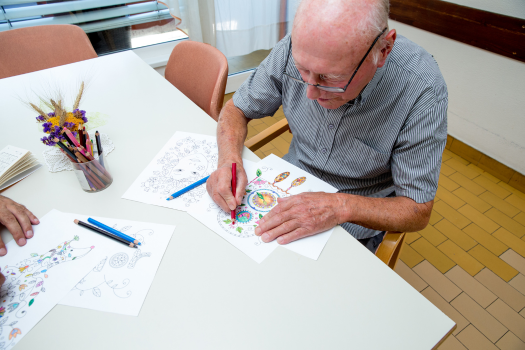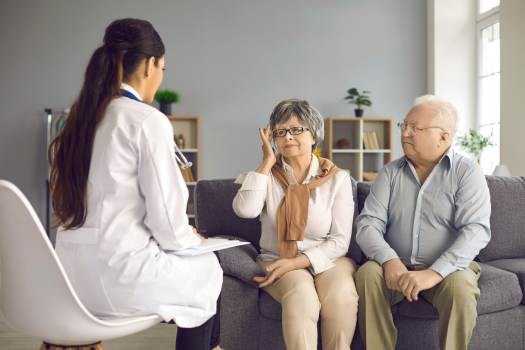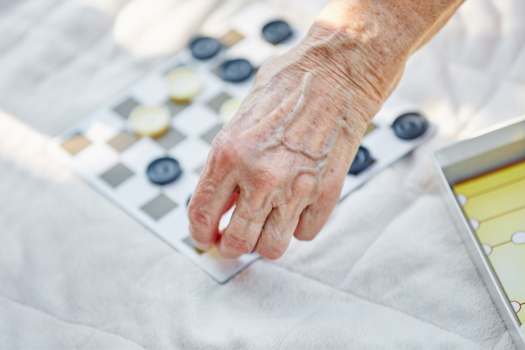
When analgesic medications fail to comfort your aging loved one, you may anxiously wonder what else can help. There are several ways to minimize pain and stimulate the body’s natural healing processes. Here are a few tips on helping your senior loved one get persistent pain under control.
Obtain a Precise Diagnosis
Unless the source of pain is clear, attempts to ease it can be futile. You can pursue various remedies without targeting the underlying problem. There’s also a risk that some treatments can be injurious, such as chiropractic adjustment for a senior with unidentified osteoporosis. Having a diagnosis can guide you in the right direction toward what actions to take.
If you suspect a particular origin of pain, see a specialist. If you’re baffled by what’s causing the discomfort, schedule an appointment with your loved one’s doctor. Once the doctor makes a diagnosis, you can ask for a specialist referral, if warranted.
Hiring a professional caregiver is one of the best ways to help your parent address pain. If you have a senior loved one who needs help maintaining a high quality of life while aging in place, reach out to Assisting Hands Home Care, a leading provider of home care Reston families can rely on. All of our caregivers are bonded, licensed, and insured, there are no hidden fees, and we never ask our clients to sign long-term contracts.
Consider Physical Therapy
Physical therapists (PTs) offer numerous analgesic techniques suitable for seniors, including ultrasound, electrical stimulation, gentle stretching, massage, moist heat, and exercise. Some facilities offer aquatic therapy in onsite pools.
After evaluating your loved one, the practitioner will design a treatment plan outlining achievable goals and steps to meet them. The PT will likely use a combination of pain-relieving methods, such as a personalized home exercise program. The prescribing doctor or PT may suggest a number of visits. Most insurance providers, including Medicare, cover physical therapy.
Contemplate Getting a TENS Unit
TENS stands for “transcutaneous electrical nerve stimulation,” and a TENS unit delivers a mild electric current through skin and along nerves. For personal use, TENS units are available as portable battery-operated devices.
To use TENS, you first secure electrode pads on the skin over painful areas and then connect the wires to the unit. Next, slowly raise the pulse level to produce a comfortable tingling sensation. Usually, treatments are automatically timed to last 20 minutes. Your loved one can use the device throughout the day as needed.
TENS alleviates pain in two ways. First, physical sensations travel faster along nerves than pain signals, so the tingling sense reaches the brain before pain can register. Secondly, low pulse rates prompt the body to produce endorphins, which are natural pain-relieving hormones. The key to TENS effectiveness is keeping the current low enough that muscles don’t contract.
Your loved one cannot use TENS if he or she has a pacemaker, implanted defibrillator, epilepsy, lymphedema, or impaired sensation. Never place electrodes over the throat, heart, eyes, side of the neck, broken skin, or sores.
Helping an older adult mitigate pain can be a challenging task. Families who find it difficult to care for their aging loved ones without assistance can benefit greatly from professional respite care. Reston, VA, family caregivers who need a break from their caregiving duties can turn to Assisting Hands Home Care. Our caregivers can encourage your loved one to eat well, exercise regularly, get plenty of mental and social stimulation, and focus on other lifestyle factors that promote longevity.
Try Acupuncture
Acupuncture employs very thin needles to stimulate nerve centers beneath the skin. When the brain receives the nerve signals, it produces endorphins. Acupuncture also reduces levels of inflammatory proteins.
In 2017, University of York researchers reviewed 29 clinical trials of acupuncture involving roughly 18,000 subjects. The scientists concluded that acupuncture reduces symptoms of arthritis, migraines, and chronic pain in the low back, knees, and neck. The findings are documented in the NIHR Journals Library. Acupuncture can alleviate tendonitis, sciatica, muscle sprains, and shoulder pain.
During a session, your loved one will lie comfortably on an exam table while the doctor inserts fine sterile needles to a shallow skin depth. Typically, needle insertion is barely perceptible. The needles stay in place for 5 to 30 minutes. The doctor may enhance the effects of acupuncture with electrical stimulation or heat from a lamp.
To find a licensed acupuncturist, ask your loved one’s primary care physician for a referral. Increasingly, more insurance providers are covering acupuncture, including some Medicare Advantage plans.
Serve Pain-Relieving Foods
There are several foods that can speed up the healing process. If your loved one needs help managing pain, consider serving the following foods:
- Cherries – Plant pigments called anthocyanins reduce inflammation by deactivating pain enzymes. With analgesic power akin to aspirin, cherries alleviate all types of arthritis, including rheumatoid and gout. To comfort achy joints, serve 10 cherries or one cup of cherry juice daily.
- Ginger – Eating ginger relieves arthritis symptoms, muscle aches, and migraines. Similar to ibuprofen, ginger has anti-inflammatory properties. Sprinkle vegetable dishes with ½ teaspoon of ground ginger, or buy ginger tea bags and serve two cups of the brew each day.
- Pineapple – Bromelain is an enzyme in pineapple that lessens joint and muscle swelling and speeds recovery from surgery. Minerals in pineapple strengthen joint cartilage, easing arthritis. Pineapple is best eaten between meals. Since bromelain also digests food, consuming it with other foods weakens its healing effects.
- Red grapes – These juicy snacks contain resveratrol, a compound that reduces inflammation and protects joint cartilage from degeneration. Offer one cup of red grapes daily.
- Turmeric – Curcumin is the key component of turmeric, and it combats muscle and joint pain. The compound also eases joint stiffness caused by Parkinson’s disease. For curcumin to be assimilated, turmeric should be combined with some black pepper and healthy fat. Combine ½ teaspoon of turmeric, ¼ teaspoon of black pepper, and 1 teaspoon of olive oil and add the blend to egg dishes, vegetables, and soups.
Don’t serve turmeric if your loved one has gastric ulcers, liver disease, bile duct dysfunction, or gallstones. Since turmeric can slow blood clotting, discontinue it two weeks before surgery. Consult the doctor if your loved one takes blood-thinning or diabetes medication.
Encourage Exercise
Whereas being sedentary worsens pain, exercise may reduce it by increasing muscle strength and joint flexibility. Exercise moderates the pain of damaged nerves by neutralizing cytokines, chemicals that trigger inflammation. In addition, vigorous activity cues the brain to stimulate the release of endorphins.
Depending on your loved one’s mobility, fun exercise options include gardening, walking, dancing, biking, swimming, and performing yoga or tai chi. Exercise classes may be hosted by the local library, community center, or senior center. If your loved one enjoys walking, consider buying a home treadmill for use during inclement weather.
If pain severely limits movement, try bringing your loved one to a physical therapy facility equipped with a pool. Aquatic exercise may be possible because the water bears body weight, lightens joint load, and helps muscles relax.
Before starting a new type of exercise, ask your loved one to grade his or her pain from 1 to 10, with 10 being the worst. If discomfort increases by more than two points, your loved one should stop and modify the activity to a more comfortable level.Seniors who want to remain healthy as they age can benefit in a variety of ways when they receive professional in-home care. Assisting Hands Home Care is here to help your loved one accomplish daily tasks, prevent illness, and focus on living a healthier and more fulfilling life. Assisting Hands Home Care can be your trusted partner in caregiving for your aging loved one. Contact one of our experienced Care Specialists today to learn more about our reliable in-home care services.






